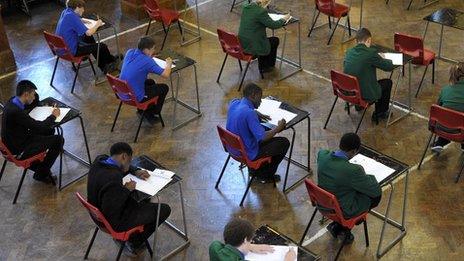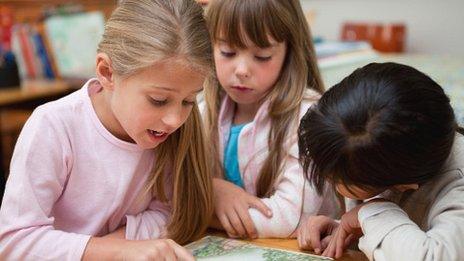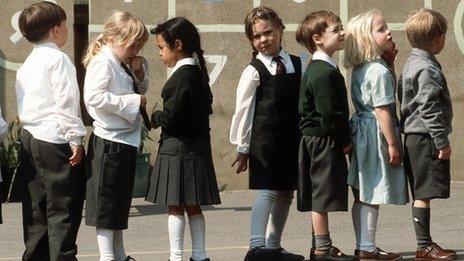Primary school places budget squeeze
- Published
- comments
Richard Cornelius the leader of Barnet Council: "We're going to have to work hard at this"
A rising primary school population in England is putting pressure on budgets and raising fears of "supersize" schools, councils are warning.
The Local Government Association says that councils have had to fill a £1bn shortfall in funding for school places.
The Netmums parenting website says some families are worried about primary schools which have expanded rapidly.
The Department for Education says it has given councils £5bn since the last election to fund new school places.
Primary schools have had to accommodate several years of rising numbers of pupils, with many schools having to add temporary classrooms and build extensions.
Figures published earlier this year showed there are 77 primary schools which now have more than 800 pupils.
Funding gap
The Local Government Association says that councils are feeling the financial pressure, having to divert funds from other parts of their school budgets.
Across England, councils say they are having to spend £1bn on providing extra places, using money that had been intended for building projects or maintenance.
Ealing Council in west London has had to top up government funding with £129m, Hillingdon has added £114m, says the LGA.
Education Minister Nick Gibb: "We have capital spending on creating new good school places"
Councils provided an extra 90,000 places last year, says the LGA, but it says another 130,000 will be needed in the next three years, as the birth rate continues to climb.
The pressure on space has meant that one school had to build its playground on a roof, says the LGA.
The LGA's survey, based on responses from over half of councils, found that three out of four local authorities claim not to have received sufficient funding from central government for extra places - and that 38% of councils have had to borrow.
The LGA says its research "lays bare the scale of the problem in funding for school places".
Councils have called for more control over the creation of extra places, complaining that the push for more autonomous academies and free schools has weakened strategic planning.
They also want a clearer funding mechanism for creating places.
"Councils are delivering, but at a cost. Since the pressure on places first emerged, councils have been getting on with the job of creating more, and welcome though government funding is, it is nothing like the full cost," said David Simmonds, chairman of the LGA's Children and Young People Board.
"The scale of this black hole is such that the cost of the creation of new school places cannot be met by council tax payers."
Mr Simmonds also warned that the pressure on places was moving up to secondary level and that another 200,000 places will be needed.
Parents' concerns
The warning from councils comes as the Netmums website says that some parents are concerned about the adverse impact of the squeeze on places.
Responses to the website from more than 1,700 people raised worries about class sizes increasing and a negative impact from too much overcrowding in primary schools.
David Simmonds from the LGA says councils have had to fill a £1bn shortfall in funding
But there were also parents who did not think that the size of a school was an important factor in the quality of education.
"Every parent wants their child to have the best education possible so it's totally understandable why the rise in 'supersize primaries' has got mums and dads so concerned," said Netmums founder Siobhan Freegard.
"Although some kids will flourish in a busier environment, many parents feel that increased class sizes and number of classes leads to their child being forgotten."
Ms Freegard says that parents needed to be more closely involved in such school expansion plans.
Labour's shadow education secretary Tristram Hunt said: "David Cameron made a commitment to parents, of smaller schools and smaller class sizes.
"But the number of five to seven-year-olds in large classes of over 30 children has spiralled by 200% since 2010 - to nearly 100,000 infants."
He accused the government of "diverting resources away from areas in desperate need of more primary school places in favour of pursuing his pet project of expensive free schools in areas where there is no shortage of places".
Education Minister Nick Gibb said that the current government was trying to "remedy the problems that were caused by failing to prepare for this baby boom by the previous government".
He told BBC Radio 4's Today programme: "We are providing significant sums of capital at a time when across Whitehall we have had to make very significant savings in order to tackle the budget deficit."
A spokeswoman for the Department for Education said: "As part of our education plan, we are giving councils £5bn to spend on new school places over this parliament.
"This has already led to the creation of 260,000 new school places, all of which are in shortage areas, with many more planned. We have also confirmed a further £2.35bn to support councils to create the places needed by September 2017."
- Published12 June 2014

- Published16 April 2014

- Published14 March 2012
